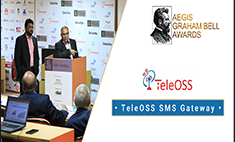SMS is an important method of communication. In our fast-paced world today, SMS has stayed one of the best ways to communicate. SMS is extremely widely available, so it can be used by many types of businesses to keep their customers updated with information such as Banking Alerts, Delivery Updates, Promotional Offers etc. An SMS Gateway is the technology that allows businesses to connect their Applications with Mobile Networks (Mobile Phone Service Providers).
This guide explains what an SMS Gateway is, how it works, and why it is essential for modern communication.
What Is an SMS Gateway?
The SMS Gateway provides a service that allows software programs, web applications, and other computer applications to communicate with mobile devices via text message through the use of telecom carriers. The SMS Gateway connects various types of computer based application systems to telecommunication networks to facilitate the flow of messages between a company or organization and the mobile telecommunication networks that serve their customers.
In simple terms, an SMS Gateway allows businesses to integrate SMS capabilities into their digital systems, enabling automated, real-time communication at scale.
How an SMS Gateway Works
SMS Gateways utilize established protocols for communication with cellular service providers, these protocols include:
- HTTP or REST API
- XML or SOAP
- SIP for Application-to-Person messaging (for sophisticated systems).
Here’s how the message flow typically works:
- When a business application needs to send an SMS, it initiates an SMS request.
- The SMS Gateway validating the SMS request then processed it and queued it for delivery.
- An outreach point is chosen by the Gateway to deliver the SMS based upon the best available connectivity option to the operators providing service to the customer with the SMS.
- The SMS gets delivered into the customer’s mobile network.
- Delivery reports (DLRs) received in real-time provide tracking of delivery status.
Why SMS Gateways Are Essential for Businesses
1. Fast Delivery Speed
SMS Gateways enable SMS delivery in seconds, so your message gets to recipients fast (especially important for sending OTPs) and for sending time-sensitive alerts/messages.
2. Worldwide Reach and Connectivity
SMS Gateways allow for multi-operator and international routing, allowing businesses to send messages to users across the globe without requiring complicated telecom integration.
3. Scalability
Whether sending hundreds or millions of messages, SMS Gateways scale effortlessly to match business needs.The multi-operator and international routing provided by Gateways allows businesses to reach users globally without the need for complicated telecom integration.
4. Integration Flexibility
Using APIs, SMS Gateways integrate easily with all types of software applications such as CRM, ERP, Mobile Applications, E-Commerce Platforms, or Enterprise Workflows.
5. Reliability & Redundancy
Advanced SMS Gateways have been developed to ensure that every SMS is delivered uninterrupted using ‘smart routing’ and ‘failover’ systems.
Key Use Cases of SMS Gateways
- Authentication: OTP (One-Time Password), Login Verification, Secure Access Code.
- Transactional Alerts: Banking updates, Order Confirmation & Payment Receipt confirmation.
- Promotional Campaigns: Offers, Sales Updates, Product Launch announcements.
- Customer Engagement: Reminders, Notifications and Requesting Feedback.
- Logistics & Delivery: Tracking shipments and Alerting when items ship.
- Healthcare: Appointment reminders, Reports and Emergency notifications.
Benefits of Using an SMS Gateway
- Cost-effective communication at scale
- Increased Levels of Customer Engagement
- Secure and encrypted message handling
- Real-Time Delivery Reports and Message Analytics.
- Multi-language and unicode message support
- A Single Method of Communicating with Customers Across All Networks and Nations.
For organizations looking to strengthen their messaging infrastructure, an SMS Gateway is an indispensable tool.
Conclusion
While the digital communication space evolves, businesses will continue using SMS as an effective medium for business communication. SMS Gateways are key to providing reliable, fast, worldwide access to SMS messaging. It provides the ability to integrate into modern systems seamlessly. Whether for authentication, marketing, customer support, or real-time notifications, SMS Gateways empower businesses to deliver timely and effective communication at scale.
If you need advanced SMS and omnichannel solutions with SMPP connectivity, routing intelligence, analytics, and WhatsApp/OTT messaging, platforms like TeleOSS provide a powerful, scalable, and enterprise-grade messaging ecosystem.


